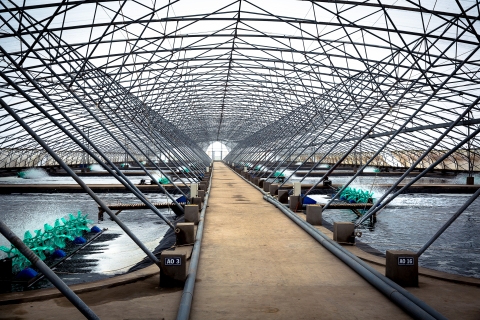UBM Launches Aquaculture Vietnam 2017

UBM, the organizer of Aquaculture Vietnam 2017 launched the event Feb. 22 at a press conference in Can Tho, Vietnam.
To be held Oct. 25-27 at the Can Tho International Exhibition Fair Centre (EFC), Aquaculture Vietnam 2017 will address issues to support the further sustainable development of the Vietnamese aquaculture industry.
According to UBM Asia's Group Director - ASEAN, Rungphech (Rose) Chitanuwat, "Aquaculture Vietnam 2017 will cover the whole aquaculture sector value chain, including feed, health and nutrition, genetics, equipment, processing and much more. A diverse technical and scientific program featuring locally and internationally renowned speakers will be complemented by a major trade show with leading exhibitors from around ASEAN and the world, showcasing the latest in products and services. Our objective is to provide aquaculture professionals valuable opportunities to network and meet decision makers, create business opportunities and provide solutions to their business challenges."
Aquaculture is essential to meet the future demand for seafood products. The sector plays an important role in the economy of Vietnam.
Seafood exports in 2016 grew by 7.4 percent in value to US$7.05 billion, accounting for 24 percent of the country's total agricultural, forestry and fisheries exports, according to the Vietnam Association of Seafood Producers and Exporters (VASEP).
The value of Vietnam's seafood exports is expected to increase by 5 percent this year to around US$7.5 billion. Aquaculture production accounts for about 65% of Vietnam's total fisheries exports in value, with shrimp, mainly black tiger prawn accounting for about half of the total export value.
Given aquaculture's strategic importance, the Vietnamese government aims to massively upgrade the country's shrimp industry with a view to boosting exports. Prime Minister Nguyen Xuan Phuc recently said the shrimp industry should strive for an export value of US$10 billion by 2025, to account for 10 percent of the country's GDP.
He noted that "inadequate high tech for intensive farming has resulted in only modest productivity of 250 to 300 kilos of shrimp per hectare; if productivity is doubled, we can immediately reach our goal."
As Asia's leading organizer of exhibitions, UBM is committed to driving innovation in and boosting the competitiveness of the Vietnamese aquaculture industry. Ms. Chitanuwat noted that "Aquaculture Vietnam 2017 can help Vietnam reach this and other goals, by facilitating Vietnam's aquaculture sectors development by partnering with governments, NGO's, industry and academia to promote best practice production systems that are environmentally friendly, consumer-oriented and economically viable."
"Recognizing Can Tho's crucial role in Vietnamese aquaculture, as one of the most potential aquaculture provinces in Vietnam, and that it is home of the College of Aquaculture and Fisheries, Can Tho University - one of the country's leading units doing research in aquaculture and fisheries, it just makes sense to hold Aquaculture Vietnam 2017 here," commented by UBM Asia's Managing Director, Mr. M Gandhi "The Can Tho International Exhibition Fair Center (EFC), will provide an outstanding setting and venue for this important industry event," she said.
Aquaculture Vietnam 2017 is supported by our valued partners; the Vietnam Fisheries Society (VINAFIS), International Collaborating Centre For Aquaculture and Fisheries Sustainability (ICAFIS), the Aquaculture Without Frontier and The International Aqua Feed Magazine.
As a part of the launch, UBM organized visits to an aquaculture farm in Vinh Long province, and a seafood processing facility in Can Tho City. The visits helped provide insights into the opportunities and challenges, and needs of the Vietnamese aquaculture sector in an increasingly competitive market.
"Don't miss this opportunity to enhance your aquaculture operation. See you at Aquaculture Vietnam 2017, where you will be inspired by ideas and innovations," concluded M Gandhi.


Add new comment